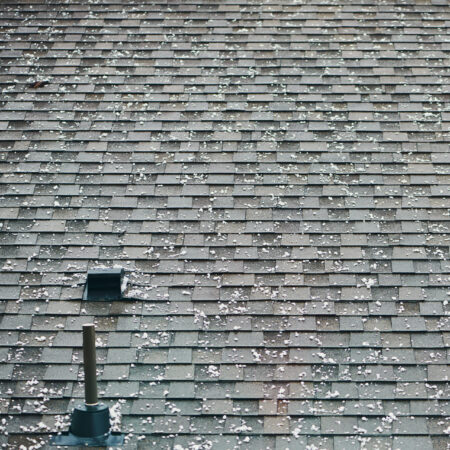Your roof is one of the most critical components of your Colorado home, acting as the first line of defense against the elements. Colorado’s unique and often unpredictable weather conditions can pose significant challenges to maintaining a healthy and durable roof. From heavy snow and ice to intense sunlight and hail, understanding how weather can affect your roof is crucial to protecting your home. In this blog, we'll explore the various weather conditions common in Colorado, the specific roofing issues they can cause, and the preventative measures you can take to safeguard your roof.
Specific Weather-Related Roofing Issues
The diverse weather conditions in Colorado can lead to a variety of roofing problems. Here are some specific issues related to each weather condition:
Snow and Ice Damage
- Roof Collapses: In regions with heavy snowfall, the accumulated weight can stress the roof structure, potentially leading to collapses, especially if the roof is not designed to bear such loads.
- Ice Dams: Ice dams form when melting snow refreezes at the roof’s edge, blocking proper drainage. The resulting water buildup can seep under shingles and into your home, leading to water damage, mold growth, and compromised insulation.
- Freeze-Thaw Cycles: The repeated freezing and thawing of water can cause cracks in roofing materials, leading to leaks and further deterioration.
Hail Damage
- Dents and Punctures: Hailstones can cause dents in metal roofing and punctures in softer materials like asphalt shingles, compromising the roof’s integrity and exposing your home to leaks.
- Granule Loss: Hail can strip away the protective granules on asphalt shingles, reducing their effectiveness and shortening their lifespan.
- Accelerated Wear: Repeated hailstorms can significantly reduce the lifespan of roofing materials, making them more prone to other types of weather damage.
Wind Damage
- Shingle Lifting: High winds can lift and tear shingles, exposing the underlying materials to the elements. This can lead to water infiltration and damage to the roof structure.
- Loosened Flashing: Flashing, the material used to seal roof edges and joints, can become loose or damaged in strong winds, leading to leaks and other issues.
- Debris Impact: Winds can also carry debris, such as branches or loose objects, which can strike the roof and cause immediate damage.
Sun Damage
- Fading and Cracking: Constant exposure to UV rays can cause roofing materials to fade, crack, and become brittle over time, reducing their effectiveness and aesthetic appeal.
- Underlayment Wear: The underlayment, which provides an additional layer of protection beneath the shingles, can also degrade more quickly under intense sun exposure, leading to potential leaks.
- Accelerated Aging: Prolonged sun exposure can accelerate the aging process of your roof, making it necessary to replace the roof sooner than expected.
Water Damage
- Roof Leaks: Heavy rain can exploit any weaknesses in the roof, leading to leaks that can cause significant interior damage if not promptly addressed.
- Mold and Mildew: Moisture trapped in the roof structure or attic can lead to the growth of mold and mildew, which can affect indoor air quality and cause health problems.
- Structural Rot: Over time, water infiltration can lead to the rotting of wooden roof components, compromising the roof’s structural integrity and leading to costly repairs.
Preventative Measures to Protect Your Roof
To protect your roof from Colorado’s challenging weather, consider the following preventative measures:
Regular Roof Inspections
Regular roof inspections are crucial for early detection of potential problems. It’s recommended to inspect your roof at least twice a year, and especially after major weather events. Early detection of damage can prevent minor issues from becoming major, costly repairs.
Proper Roof Ventilation
Adequate roof ventilation helps regulate temperature and moisture levels in the attic, preventing heat buildup and reducing the risk of ice dams. Proper ventilation can also extend the life of your roofing materials.
Ice and Water Shield Installation
Installing an ice and water shield under the roofing materials can provide additional protection in vulnerable areas, such as valleys, eaves, and around chimneys. This barrier helps prevent water from seeping into your home during freeze-thaw cycles and heavy snowfalls.
High-Quality Roofing Materials
Choosing high-quality, weather-resistant roofing materials is crucial in Colorado. Impact-resistant shingles, for example, can better withstand hail, while UV-resistant materials are essential for sun exposure. Investing in quality materials upfront can save you from frequent repairs and replacements.
Professional Roof Maintenance
Hiring a professional for routine maintenance and repairs ensures that your roof remains in top condition. Professionals can spot and fix issues that might not be visible to the untrained eye, providing peace of mind and prolonging the life of your roof.
When to Consider Roof Replacement
If your roof has sustained significant weather-related damage, it might be time to consider a full replacement. Some signs that replacement is necessary include:
- Extensive Damage: Large areas of missing shingles, widespread leaks, or severe granule loss can indicate that repairs may no longer be sufficient.
- Old Age: If your roof is approaching the end of its expected lifespan, weather-related wear and tear might accelerate the need for replacement.
- Persistent Issues: Recurring problems, despite regular maintenance, could suggest that your roof has reached the point where replacement is more cost-effective than continual repairs.
Roofing Solutions in Colorado
Colorado’s weather can be harsh on your home’s roof, but with proper understanding and proactive measures, you can protect your roof from the elements and extend its lifespan. Regular inspections, quality materials, and timely repairs are essential to keeping your roof in top condition. If you’re unsure about the state of your roof or need assistance with maintenance or gutters, consulting with a roofing professional can provide the expertise and peace of mind you need to ensure your home stays protected, no matter the weather.
